LOST 002 - It Only Ends Once
Starting the story at the hub of the wheel. Unpacking the TV show LOST—Part 2
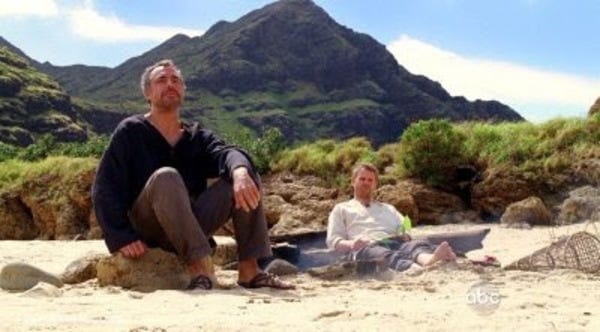
Note: this essay was originally published on Revue on December 13, 2021.
Hi.
A lot of people seemed to enjoy the LOST issue of the newsletter, which means this is a political and a LOST hybrid newsletter now. Sorry to those who only want one or the other; I’ll introduce a loose expectation for an alternating subject every other week, so nobody gets too bored.
Last time I’m warning: I’m spoiling the shit out of this show.
A quick word on intent. I won’t be spending much time on what the writers/creators intended. I find that boring, and frequently unhelpful. As a creator myself, I am of the opinion that what creators make usually escapes their intent. I’m going to deal with what we have, which is the actual story.
Now, here’s what’s happening for the next several installments: My methodology is going to focus first on exhuming as much of the buried understory of LOST as possible, so we’re armed with it before entering the main narrative.
So I’m going to contemplate a handful of revelatory late-season scenes and episodes, which I think condensed the entire main story—the whys and wherefores of everything—in such a way as to make it almost indigestible to a viewer on a first viewing; a narrative gambit that might be brilliant, or might be a massive structural error, or maybe it’s even both, but which I think aptly fits the main dialectic I perceive: observation vs. belief.
And that’s how we’re going to excavate the understory: observation and belief. First we’re going to observe. Then we’re going to believe.
Put another way: I’m going to draw conclusions that are directly present in the “text” of the show. Then I’m going to make extrapolations based on those conclusions, which I think those conclusions suggest, but which are not directly present in the text.
Enough. Let’s get LOST.
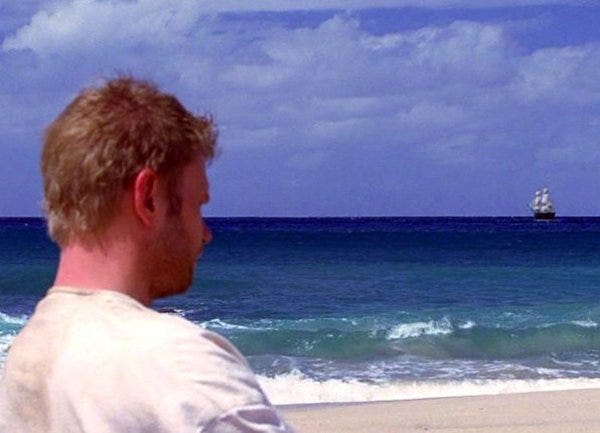
I’m starting with a scene that is very hub of LOST’s narrative wheel, and one of my favorite scenes in the show (maybe even in narrative fiction), simply because of how much it accomplishes in so little time, and how deftly it does so. It’s easily the most successful of these backstory interludes I’m starting with.
Namely, it’s the 4-minute cold open to the Season 5 finale, The Incident.
While there is a lot of incident in The Incident, incidentally, there is very little incident in this scene. However, there is massive consequence. Every line tells, and most lines tell a lot.
So, let’s pay close attention, and do something I (mercifully) won’t be doing throughout the whole series. Let’s go line by line.
O B S E R V A T I O N
We open on a male-presenting figure in a white tunic. He’s working at a loom in a sparsely-appointed interior space, which is cave-like but clearly domestic. The loom belonged to his predecessor, but we don’t know that yet; let’s just note it for now.
In the center of the space there’s a large fire. By the end of The Incident, at a time centuries in the future, the dying body of the figure in white will be kicked into this fire by his murderer. We also don’t know that yet, but let’s just note it; and let’s also note that this story jumps around in time a lot, which I mention mostly to observe that the narrative construction of this show, from the very beginning, has encouraged viewers to become comfortable with experiencing time as nonlinear. Much more on that later, probably.
Next we see him in a tidepool, on a bright sunny day, gathering a fish from a handmade trap. He sits on the beach and cooks the fish in two fillets on a flat rock heated by a small fire.
From this I would observe that the man in a white tunic requires sustenance like a normal person would. He is, in other words, corporeal in many of the usual ways. Human in many of the usual ways. I think we’re meant to understand from the presence of the 2nd fillet he expects company … but that’s more a matter of belief.
As he eats one fillet, he observes a galleon, anchored perhaps a half-mile off shore. His aspect suggests no surprise or concern, only curiosity.
A man in a black tunic approaches. He and the man in white exchange pleasantries. The man in black sits beside the fire, looking out at the galleon.
(This doesn’t matter at all, but the ship the two entities observe is clearly meant to suggest to us a ship we’ve seen before, called the Black Rock, and at some point we’ll get into whether or not it is the Black Rock.)
Most viewers will instinctively understand the man in white to be Jacob, a mythic figure of religious reverence for many of our characters, who has until now been much discussed but never glimpsed. The man in black, who we have never seen before, is likewise instinctively understood to be the malevolent and mysterious creature who has appeared to most of our characters at some point in the narrative, who sometimes manifests as various dead people, but who most frequently manifests as black smoke.¹
We’ve been waiting for this moment for a long time, if we’re fans of this show. We’re primed to pay close attention, which is good: this will all matter, a lot.
We need to give these figures names.
Let’s call the figure in the white tunic “The Island.”
Let’s call the figure in the black tunic “The Adversary.”
(Calling them this is a bit of a cheat, because it rests on belief rather than observation—a belief I won’t entirely unpack this time. But I’m the creator of this newsletter, so I get to make the rules, and break them when it suits me.)
Line by line, now:
The Island: Want some fish?
The Adversary: Thank you. I just ate.
An interesting comment—and a strangely ominous one, if we’ve figured out who the figure in black is. Is it Jacob² taunting his brother (spoilers)? Or is it The Island taunting The Adversary? Does the smoke eat? Can the smoke eat? And is its reply a taunt in return? What or who does the smoke eat?
The Island: I take it you’re here because of the ship.
The Adversary: I am. How did they find the island?
The Island: You’ll have to ask them when they get here.
So these entities know something we as viewers already have received ample evidence for: this island³ is hard to find. They have some knowledge of this island’s unusual positioning in context with the earth (about which definitely much more later).
The Adversary: I don’t have to ask. You brought them here.
So, the people who come to the island are perceived by The Adversary as brought there by The Island—a perception that The Island neither confirms nor denies in this scene, but which it will confirm in later scenes.
The people who come to the island are chosen people.
Chosen by The Island.
The Adversary: Still trying to prove me wrong, aren’t you?
The Island: You are wrong.
Here we arrive at the very hub of the hub. We’ve been watching people on an island. We’ve since seen a wealth of strong evidence that their arrival on the island was no accident, was in fact orchestrated, by forces that seem to approximate something like fate, and that their entire lives up to the island seemed to have been similarly manipulated.
What we’re learning is that everything that’s happened in this narrative is framed in some way around a disagreement between these two entities.
The Adversary also believes the Island is bringing people to the island in order to prove itself right, and prove the Adversary wrong. The Island does not deny this supposition; neither does it confirm it. However, The Island does confirm that it believes The Adversary is wrong. It’s the only point in this scene (which, as we’ll soon see, includes a death threat) where The Island’s tone grows sharp.
Notice, “still.” This has happened before.
This is an old argument.
The Adversary: Am I? They come. They fight. They destroy. They corrupt. It always ends the same.
This tells us two very important things.
The first is the nature of the disagreement, which is about the worthiness of humanity.
The Island seems to think humanity is worthy.
The Adversary seems to think they are not.
Next, we’ve learned this hasn’t happened just once before. It’s a cycle. We can safely conclude that the main characters we’ve been following for 5 seasons are an iteration of that cycle. There are other people our main characters have interacted with, and we can presume they are leftovers from other iterations. This cycle involves people coming to the island, fighting and destroying and corrupting—and, indeed, we certainly have seen a lot of that over the course of 5 seasons.
The Adversary sees each cycle ending in the same result every time. We might guess this is at least one source of its frustration. Perhaps The Adversary would, if he had access to social media, bestow upon The Island a meme misquoting Albert Einstein, about the nature of insanity.
The Island: It only ends once. Anything that happens before that is just progress.
Here we are meant to see that The Island takes a longer view, which suggests some deeper knowledge, or—from The Adversary’s perspective, anyway—some deeper cruelty or delusion.
And we are meant to see that The Island is interested in whatever it sees as progress.
The Adversary: Do you have any idea how badly I want to kill you?
The Island: Yes.
This isn’t a minor disagreement, for The Adversary, anyway. It’s existential.
The Adversary: One of these days, sooner or later, I’m going to find a loophole, my friend.
The Island: Well, when you do, I’ll be right here.
So, we’ve established that there is a hierarchy here. A greater and a lesser. The Island has some measure of dominion, and it extends to dominion over The Adversary—at least to The Adversary’s ability to kill the entity in white.
Additionally, it seems that The Island’s constraints are legalistic in nature … in other words, beyond the letter of its law, there doesn’t seem to be much to constrain The Adversary. And if the Adversary can find ways around the letter of that law … it will.
Additionally, it seems that the idea of being killed doesn’t trouble The Island.
The Adversary: Always nice talking to you, Jacob.
So, one of our two suspicions confirmed: The figure in the white tunic’s name is the entity we’ve heard referred to as “Jacob” throughout the show.
And, as The Adversary takes his leave, the camera shows us, for the first time, that the two of them are talking at the base of an immense statue—a statue we’ve previously only seen the demolished remnant of, now revealed as a massive figure of an Egyptian god.
This gives us a setting for this scene within the story … it’s long ago. Very long ago. It’s before. It also lets us know for how long even prior to this long-ago scene this story has been taking place.
How long? At least as far back as ancient Egypt.
That long.
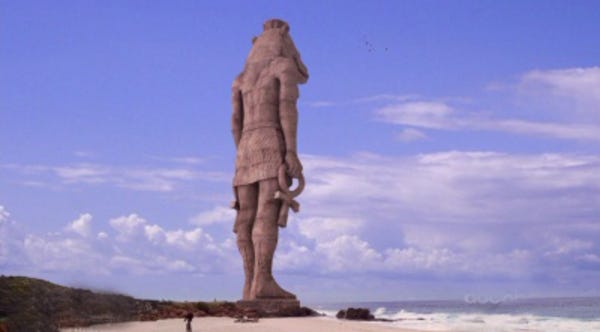
Let’s recap the observations:
1) The reason that people—including all our heroes and villains—have come to the island is that they have been drawn there by a godlike entity, over the objections of a 2nd lesser godlike entity. The 2nd entity believes these people are meant to embody proofs in an ongoing philosophical/spiritual disagreement between the two.
2) The disagreement is over the nature of humanity, specifically whether it is redeemable, or irredeemable.
3) The Island brings people and invites the Adversary to observe. The Adversary observes that the people fight, kill, and corrupt every time, which reinforces its belief that humanity is irredeemable.
4) The Island takes a longer view of things than the Adversary, and appears to be interested in progress.
5) The Island has some measure of dominion over the Adversary, and has placed at least one restriction on them: one that doesn’t allow The Adversary to kill The Island.
6) The Adversary tires of this argument. It wants to kill The Island.
7) The Adversary is seeking a way to do so, through a loophole.
8) This is all part of a cycle.
9) This cycle been going on for a very very long time.
All of these are observations: in other words, they are present in the text. They don’t require speculation, they just require careful attention and a bit of thought.
Now, before we finish, here are a few of my beliefs, based on these observations.
B E L I E F
1) There’s a tendency of any show to have characters make pronouncements in such a way that the viewer takes them onboard as true, and that’s the way we watch shows, with the understanding that if those pronouncements turn out to be false, we’ll be told that. What makes LOST different is that when the person making the pronouncement is either being deliberately misleading, or is flat-out lying, or (and this most commonly) actually believes they are right when in fact they are fundamentally mistaken, we’re often never told that, and the character making the mistake often never discovers their mistake.
This effect is a narrative trick that allows the show to hide its deeper truths in plain sight. It’s sleight of hand, using the existing expectations of narrative television that an audience already has. It’s LOST’s best magic trick, and it’s a neat one, though it’s one I think LOST performed too effectively for its own good—to the point that, when events occur that contradict the “explanation” the narrative has delivered, we viewers, having thoroughly digested the beliefs we’ve been given, often refuse to reconstruct our understanding, and assume that the new information is a narrative error on the part of the writers, or evidence that they don’t have a handle on their story.
I wrote about this effect extensively enough in the first installment, and to avoid doing so in each installment, I’m going to call this effect “the presto” for shorthand.
I believe there’s almost no presto in this scene. I believe everything we’re given is the straight stuff; real explanation, as close as we’ll ever get.
With one exception: I believe The Adversary may be mistaken about why The Island brings people. I don’t think it’s to prove The Adversary wrong. I don’t think The Island feels any need to prove anything to anyone.
I think Jacob wants to prove his brother wrong … but that’s a matter for later.
I believe The Island brings people to the island because it is interested in progress.
2) I believe the nature of this argument deliberately suggests ancient myth. Specifically, an argument between two godlike entities over the worthiness of humans is meant to make us think of the ancient poem that gives us the book of Job, in which Satan (rough translation: Adversary or Prosecutor) brings a similar argument to YHWH, in which humans (Job and his family and friends) are used as props in an object lesson.
The primary conclusion to be drawn from this belief is that we’re meant to think of the stakes of this conflict as biblical in scope. Life, the universe, and everything, so to speak.
3) The next belief naturally follows from the previous belief: I believe we are meant to understand that The Island is a figure that maps to our biblical conception of God, and that The Adversary is meant to map to our biblical conception of Satan. And I believe we’re meant to observe that these people incarnate themselves, for reasons as-yet unexamined, as human beings.
4) This means that I believe that The Island is actually meant to be thought of as the originator of the universe, and that the destruction of The Island would bring about the destruction of the universe itself—which is precisely what The Adversary hopes to accomplish. We’ll get to proofs of this later.
But this also suggests that the nature of The Island’s relationship with The Adversary is one of creator and creation, or parent and child.
5) To take this one step further—and this one doesn’t matter as much to understanding the story, but I find it very narratively satisfying—I believe we’re meant to understand that the island and the things that happen there, including the smoke, the extended lives, the temple, the pool, the water, the light, and other things I haven’t mentioned here, were inspirations for the narratives found in ancient texts such as the Torah and Tanakh. I’ve already mentioned Job, but … certainly the idea of a tribe coming out of ancient Egypt that become chosen people, and go missing for decades before re-emerging to conquer, guided by a pillar of smoke … well, it would line up with the narratives of both Exodus and LOST, just as the idea of a paradisal cradle of life with forbidden fruit at its center, which, once tasted, led to expulsion and death, would line up with the narratives found in both Genesis and LOST.
Am I saying when the LOST writers write about the island, they mean it to be about the Garden of Eden?
No. I’m saying in the world of LOST, when the writers of Genesis wrote about the Garden of Eden, they meant it to be about the island.
Neat, right?
That’s enough for now.
These are some of my beliefs about LOST, and they are mine, and belong to me and I own them, and what it is too.
Now you might be wondering—especially if you haven’t skipped down to read the footnotes—Hey! What is all this “The Island” talk? That’s not the island. That’s Jacob! We’ll see him in a later episode as a boy. His mother comes to the island while still pregnant with him, so how can he be the island? He’s Jacob! He calls himself Jacob! Why not just call him “Jacob?”
Yeah … let’s save that for next time.⁴
L O S T
NEXT TIME: Being, The Ricardus
_____
¹ Or maybe a viewer doesn’t understand that. Anyway, if a viewer understands this, they’re right: that’s exactly what/who they are.
² Jacob, not The Island. I’m not going to explain why this time.
³ Lowercase usage indicates the geographical construct of the island; uppercase indicates the spiritual/cosmic entity that I name The Island. Again, I’m not explaining this bit yet, so if it’s confusing right now, stay with me. Hopefully it will all make sense before long. I promise I’ll try, anyway.
⁴ Which will be in 2022. I’m taking a newsletter vacation for the next two weeks. See you then!
_____
A.R. Moxon, Brackets, Miss, Brackets, is the author of The Revisionaries, which is available in most of the usual places, and some of the unusual places.
He also has a second theory about the brontosaurus, called his second theory, or his theory number two.

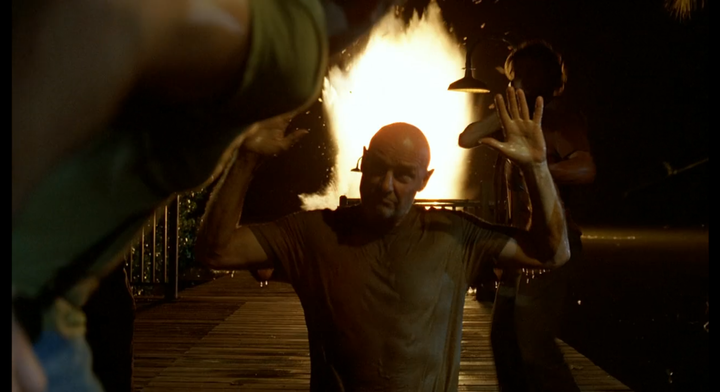
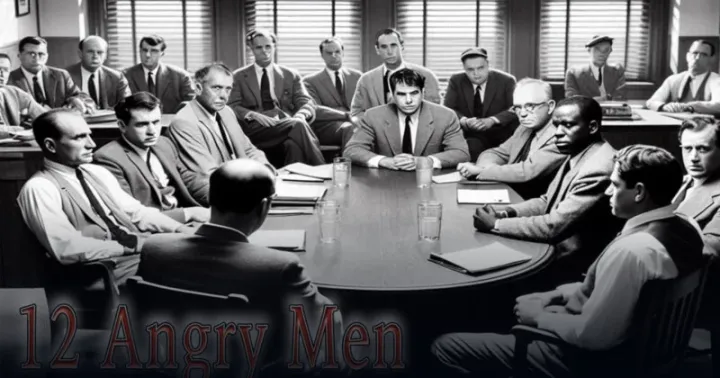
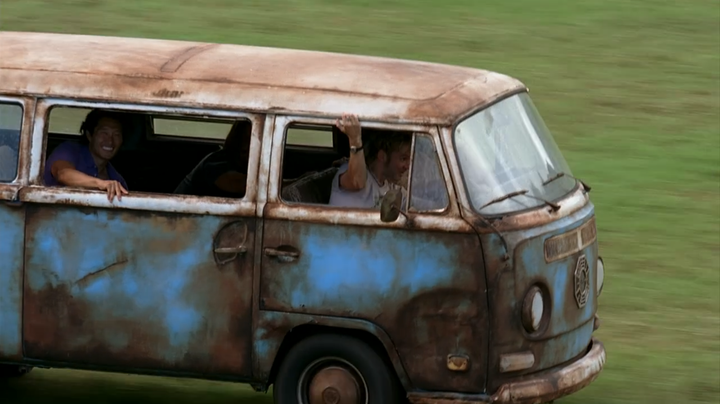
Comments ()